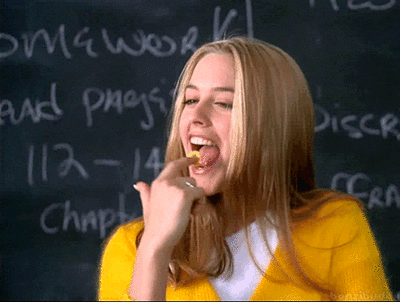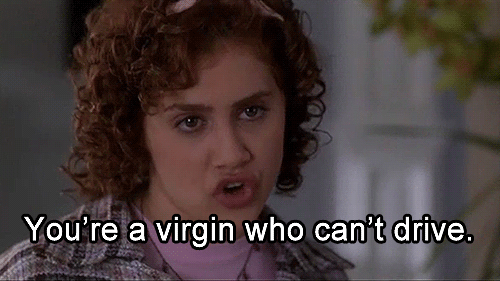Beyond the Bechdel Test: ‘Clueless’ (1995)
By JORDAN ECARMA
This column is what happens when you’re a conservative feminist who loves movies. The Bechdel test is pretty basic: Does this movie have a scene where two women with names talk about something other than a guy? The point of the test is not “movies that pass this are feminist”—it’s “this is the absolute base point of whether or not women are their own people in this movie.” I attempt to go a little further each week with a deeper analysis.
The film: If you haven’t seen “Clueless,” stop reading my blog post and go watch “Clueless.”
The conversation: “Clueless”—which by the way, celebrated its 20th anniversary this year—passes the Bechdel test all over the place. Sure, Cher, Dionne and Tai may talk about boys, but they have plenty of other topics to occupy their time: grades, feelings, popularity, drugs (usually the self-imposed lack thereof), fashion, teachers, Tai’s makeover.
The real deal: It might be iconic now, but writer and director Amy Heckerling had an uphill battle getting “Clueless” onscreen. One objection during the struggle was the prevalence of the main character.
“During the development there was a concern that it was too much about one female, and that I should make Josh a bigger part,” Heckerling told Vanity Fair in a July interview. “And he should be living next door, and his mother [should be] in love with her father.”
I know it’s an intentionally lighthearted film not built for hyper-analysis, but for the sake of this column, let’s take its world as seriously as Cher does. And here is the feminism of “Clueless”—the fact that Cher runs the show.

“Clueless” may culminate in a romance, but it’s first and foremost a film about women. Female friendships and loyalty to those ties are all-important, while women drive all of the storylines. Cher, Dionne and Tai are not only the most developed characters but also the most powerful ones.
In particular, Cher goes through a character arc of struggle, crisis and redemption—the last happening through a “soul makeover.” She goes after what she wants and makes concrete changes when she realizes her life needs new direction.
Cher also shows strength by making her own sexual decisions regardless of peer pressure. Her opposite would be Sandy in “Grease”—the girl who gets rid of her personality in order to get the guy. Cher wins the guy as a tangential benefit to becoming a better, more complete version of herself. Even though her virginity is mentioned, it never becomes an important plot point.

This piece wouldn’t be complete without discussing the subtle feminism in “Clueless” fashion. For all the scenes where Cher is picking out an outfit, her meticulous grooming is far more about confident expression than anything else. Cher is never insecure about her appearance but doesn’t find her entire value in it either. Even when Cher and Dionne give Tai a makeover, it’s not about giving her self-worth. Tai is already a fun, happy, bubbly person. The new clothes and hair simply become an expression of her outgoing personality.
One thing that sticks out while watching “Clueless” in 2015 is how shockingly conservative it is. Men and women are complementary beings, both special in a unique way. Cher lives out “traditional” womanly qualities by being nurturing toward her dad and her step-brother-turned-love-interest, both of whom cherish and protect her.
Women are still the driving characters in “Clueless,” but men remain important as well. Cher may be smart, gorgeous, confident and a great negotiator, but at the end of the day, she still needs her dad to reassure her that she’s “the most beautiful girl in Beverly Hills.”
And there’s nothing unfeminist about that.
Jordan Ecarma is a former journalist now living the millennial dream: getting paid for writing Facebook statuses (that is, digital PR). She watches her use of the f-word (“feminism”) around conservatives and the c-word (“conservatism”) around feminists. Find her under @JordanEcarma.




1 Response
[…] Cher’s decision to improve Tai is intended to make her more attractive to boys and Cher’s desire to make herself a better person through charity work is designed to turn her into the type of person Josh would like. Cher famously lists all the ways to make herself more desirable to men, talking about how ‘anything you can do to draw attention to your mouth is good’ and recommending showing a little skin as ‘this reminds boys of being naked, and then they think of sex.’ No matter if it is their choice, all of them are still stuck within patriarchal relationships structures and still feel judged by whether or not they have a boyfriend. The Paradox Project described them as the opposite of Sandy in Grease – girls who ‘get rid of [their] personality in order to get the guy.’ […]